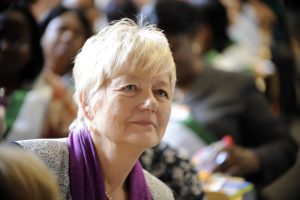Ilona Kickbusch, global health expert and keynote speaker at the European Health Forum Gastein 2020, in an interview on growing up in a digital world, the dark side of digitalisation, and how policies can be designed to promote health.
Interview: Dietmar Schobel
HEALTHY EUROPE
Prof. Kickbusch, how has digitalisation changed the process of growing up?
Ilona Kickbusch: Every generation has had its own “new medium”. In the past this has been the radio, then television, and most recently the computer. Right now it is the smartphone. Our children today take it for granted and live in both worlds: real and virtual. They are often in contact with the same people in both places – friends, schoolmates and relations. Having said that, building relationships is a fundamentally different process on digital platforms. This is true for interpersonal relationships and also for how people see their own bodies. “Photoshopped” pictures that have been digitally altered using software have become part of everyday life on the internet, and children and young people frequently feel compelled to live up to these images. Pornography is an extreme example of this. It has been made accessible around the clock via the world wide web, and the image of sexuality conveyed to adolescents is an unrealistic one.
HEALTHY EUROPE
Is digitalisation harming the health of children and young people?

Ilona Kickbusch: We know that spending too much time in the virtual world, in front of the screen of a smartphone or computer, can have a negative impact on the mental health and also on the physical health of children and young people – if only because there is a lack of time for adequate healthy exercise in the real world. However, there is substantial scientific research that describes beneficial effects – such as those on cognitive performance by computer games, or those of reputable online platforms that support young adults suffering from psychological problems. Deliberations about childhood in the digital age and the consequences for health go far beyond the direct influence of new media on children and young people, though. We are all currently experiencing the transition into a digitalised world – the “digital transition”, which is proceeding at a tremendous pace and is gathering even greater momentum in the coronavirus crisis. It is pervading all social spheres, and is affecting all groups and ages in one way or another. Children and young people are particularly vulnerable in this regard – also because they are especially susceptible to the marketing strategies of the IT industry.
Our children today live quite naturally in both worlds: real and virtual.
ILONA KICKBUSCH; GLOBAL HEALTH EXPERT
HEALTHY EUROPE
What are the effects of the digital transition in the health sector?
Ilona Kickbusch: In the health sector, the focus has previously been exclusively on the potential positive sides to digitalisation – such as earlier detection of diseases or using technical tools to motivate people to adopt a healthier lifestyle. The dark side of digital health has been long overlooked. On the one hand, IT giants such as Amazon, Google, Facebook and Alibaba have access to huge volumes of personal data and use this solely for their own commercial aims. In this context, the health sector is a very large and promising business segment. On the other hand, digitalisation offers countries new possibilities for surveillance and authoritarian governance. The risk of technology and data-driven control systems developing in sectors that are considered benign – such as health, education, social welfare – is possibly even greater than elsewhere. We cannot ignore the huge risks of digitalisation any longer. We cannot develop digital health as a human rights-free zone and destroy our children’s future in the process.
HEALTHY EUROPE
What goals have been specified here by the Lancet & Financial Times Commission “Growing up in a digital world: Governing health futures 2030”, which is co-chaired by you?

Ilona Kickbusch: The Lancet & Financial Times Commission is exploring the convergence of digital health, artificial intelligence (AI) and other frontier technologies with universal health coverage (UHC). We want to contribute to integrated digital development that improves the health and well-being of children and young people. In connection with this, we are examining existing policies for digital health, AI and UHC to identify those with the greatest potential to improve health and well-being, maximise health equity in resource-poor settings and ensure human rights. We want to deliver a clear set of recommendations on the governance of digital health, AI and UHC, taking into account geopolitical, economic and social factors. The Commission consists of 19 international experts and will work with representatives from youth organisations as well as focus groups with young adults. The report by the Commission will be presented by the end of 2021.
HEALTHY EUROPE
Can you give a specific example of good practice for digital health strategies that contribute to improving people’s health and well-being?
Ilona Kickbusch: The Montreal Declaration for a Responsible Development of Artificial Intelligence from 2018 is an example of such good practice. Just like the WHO Ottawa Charter for Health Promotion that was approved in 1986 and is based on the premise that health is a political choice, the Montreal Declaration is grounded in the idea that matters related to ethics or abuse of technology ultimately become political and therefore belong in the sphere of collective decisions. It includes, for example, the well-being principle which postulates that artificial-intelligence systems must first and foremost permit the growth of the well-being of “all sentient beings”. The respect for autonomy principle makes strong reference to the empowerment of citizens and the fostering of literacy and critical thinking. The solidarity principle states that “the development of artificial-intelligence systems must be compatible with maintaining the bonds of solidarity among people and generations” and includes special reference to health systems. Policies such as these can set the agenda for how digitalisation of the health sector can be designed to benefit all groups of the population, and specifically children and young adults.
Ilona Kickbusch was born in Munich in 1948 and studied sociology and political sciences at the University of Konstanz. She is the Founding Director of the Global Health Programme at the Graduate Institute of International and Development Studies in Geneva. Between 1981 and 1998 she worked for the World Health Organization (WHO) and was the key instigator of the Ottawa Charter for Health Promotion in 1986 which serves as the basis of health promotion at national, international and global levels.
